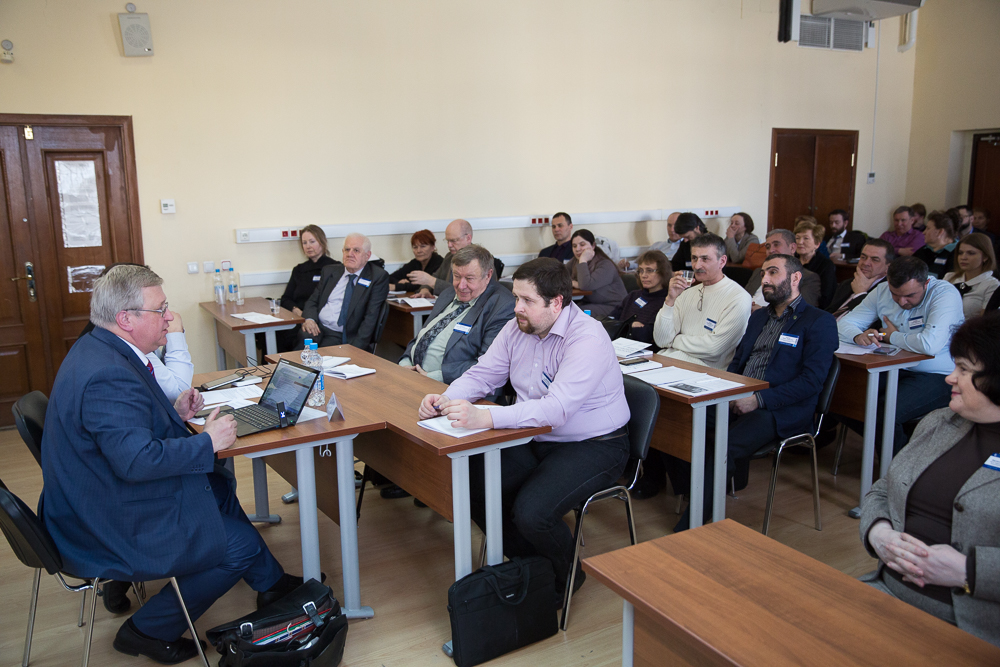
Published: March 30th, 2017
On March 30, within the framework of the Moscow Economic Forum (MEF), a Round Table " The view of Russia’s traditional confessions on the ethics of monetary policy" was held. The moderators of the discussion were the chairman of the Supervisory Board of the Institute of Demography, Migration and Regional Development Yuri Krupnov and a member of the Expert Center of the World Russian People's Council Sergei Volobuev..
The discussion was attended by Protopriest, rector of the Church of the New Martyrs and Confessors of Domodedovo Maxim Kolesnik and Orientalist, senior researcher of the Institute of Demography, Migration and Regional Development Salman Mirzai.
Opening the discussion, Yuri Krupnov identified two opposing positions: the priority of efficiency over ethics on the one hand, and the primacy of religious outlook and ethics in relation to the economy - on the other hand. According to the moderator, a third version is needed, which will unite opponents.
The topic was continued by coordinator of the Union of Orthodox and Muslims Eldar Orujov. He contrasted the desire to accumulate the economy as such, which has as its goal the production of goods for human life. He complained about the fall of morality: today no one has replaced the church in the matter of her upbringing. The speaker emphasized the discrepancy between the existing norms of doing business in Russia and the ethical values that exist in, for example, in Islam, such as: "freedom of entrepreneurial activity and conclusion of a treaty, justice, lawfulness, ethical behavior of managers and subordinates, charity and mercy."
The position of the Orthodox Church was presented by the protopriest Maxim Kolesnik. According to him, the collapse of the catching-up model of modernization, leading to a backwardness from the leading countries and social inequality, lies in the anti-human nature of neo-liberal ideology. Now, traditional social values are rejected, and the process of separating labor from wealth leads to a rejection of a reasonable measure of consumption and a person's falling into a debt trap. The task of the church in this situation, according to the speaker, is to help the society build social and economic relations so that everyone has the opportunity to realize their talents and creative abilities. "To this end, the church is ready to develop a productive dialogue with national and supranational institutions responsible for the social and economic development of society," Kolesnik concluded..
Yuri Krupnov, Chairman of the Supervisory Board of the Institute for Demography, Migration and Regional Development, said in his speech that the economy was misunderstood: it was not due to opportunities bought at the cost of constraints and difficulties, but to "co-workers", the creative process. "In addition to exposing this truly parasitic, anti-human, anti-divine, anti-natural economy that was imposed on us and which still dominates, it is still very important to follow the path of creating a worldview of the economy completely different," he noted. The creation of such an economy is realistic with the support of existing teachings and the heritage of its predecessors.
Tahir Askerov expressed the position of Islam regarding banking activities. He introduced the participants of the discussion to the concept of "Islamic banking", the main purpose of which is to extract public benefits. These institutions operate on an interest-free basis, and now in Islamic countries there are more than 150 such organizations.
The topic of the Islamic concept of financing was continued by Tatiana Egorova-Gudkova, Ph.D. in Economics. She noted one of the main shortcomings of the Russian approach to providing projects as opposed to the Islamic one: "Our banks, unfortunately, ends their interests when they have decided on financing, and they already know what benefit they will receive. Next, the one who is engaged in the project - is forced to do it by himself, "- said the economist. Islamic banks also divide the risks of projects that are invested. This is what is the main source of profit for such credit institutions.
Candidate of legal sciences, associate professor Hamlet Atanesian criticized the monetary policy. "Why talk about ethics, if the legal norms violate the constitutional human rights?" - said the speaker. According to him, the laws on the Central Bank, on banks and banking need to be processed. The law on microfinance institutions, which legitimizes "predatory" 120% per annum, provokes indignation..
Yuri Krupnov supported the speaker, noting, however, that the legal consciousness follows the world outlook.
His idea of improving the working capacity of financial instruments was laid out by businessman Gershog Smolensky. In his opinion, one of the main risks for business in Russia is the judicial system. It is this risk that can be bypassed by the supranational system of record keeping: the first instance of the proceedings in such a situation will be, for example, the rabbinical court. The speaker supported the adherents of Islamic banking: the idea of combining the credit and investment component in one financial product, he said, has serious economic advantages.
The participants discussed the destructiveness of the monetary policy existing in Russia and the advantages of an alternative monetary policy based on an interest-free loan and reflecting the Orthodox and Muslim approach to the economy. Various strategies for organizing the explosive growth of the economy were voiced through the creation of an independent financial system. In the opinion of moderators of the discussion, the accumulated experience of using religious ethics in economic processes is really capable of fundamentally changing the existing system of lending and investment, if traditional financial instruments are adopted for service.
Latest news
07.05.2018 MEF-2018: debate "Cultural policy: between individual freedom and the interests of society?"
07.05.2018 MEF-2018: Conference No. 8
07.05.2018 MEF-2018: Conference No. 4
07.05.2018 MEF-2018: Conference No.3
07.05.2018 MEF-2018: Conference No. 2
07.05.2018 MEF-2018: Conference No.1
26.04.2018 McConnell Discusses Information Warfare
20.04.2018 MEF-2018: closing plenary session
17.04.2018 Mr. Freysinger: «Skripal’s case» for relationship between Russia und European Union?
